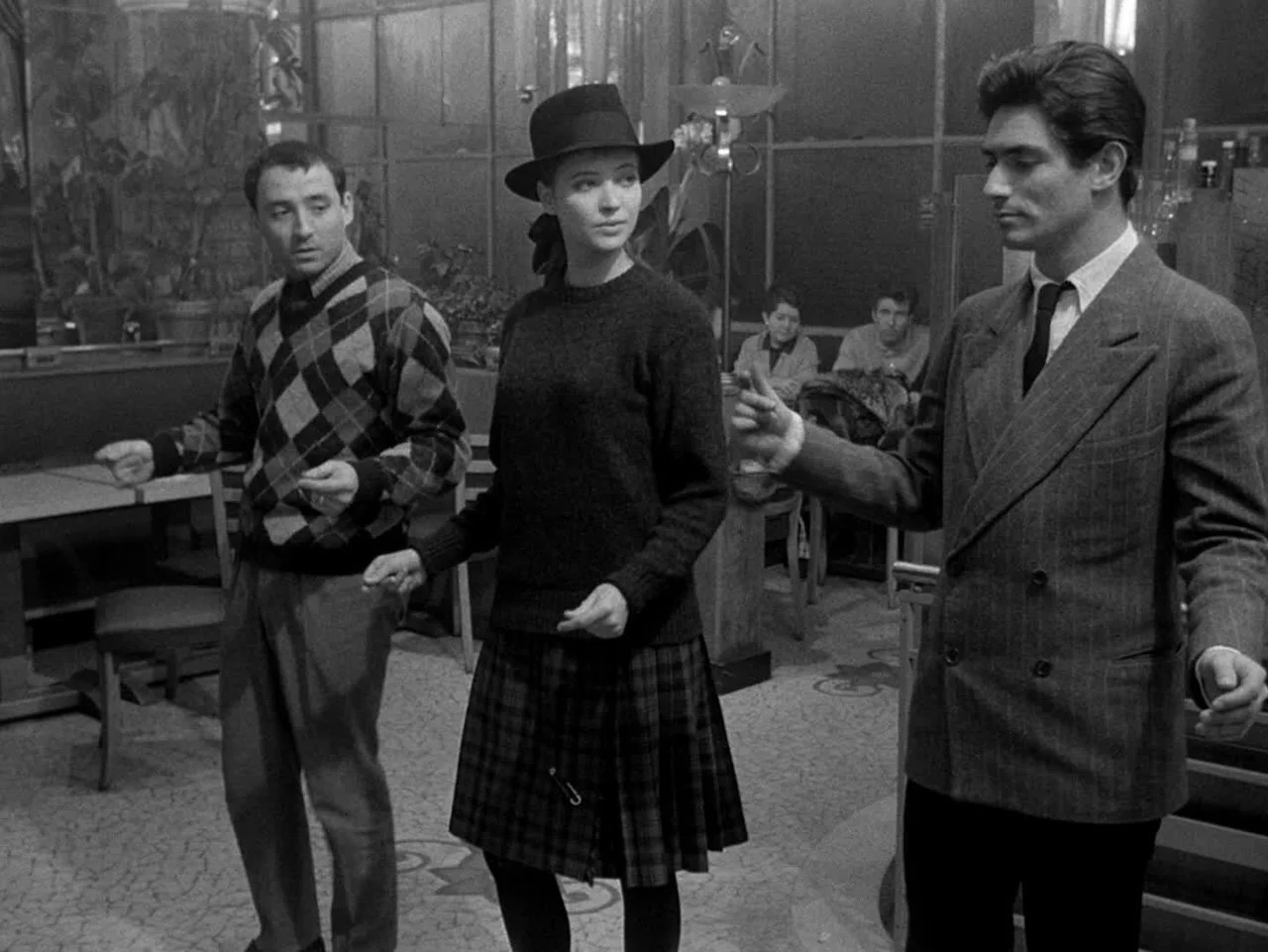band of outsiders (1964)
A dreary, dismal Parisian sky, a Siene that looks black and clogged with debris, a ‘55 Simca spinning its tires in the mud, dodging construction vehicles, even our script (or lack thereof) is a tattered dime novel on yellowed paper that probably fell behind a book shelf ages ago. With these cheap and tawdry trappings, Godard locates the poetry within, beneath and orbiting the B and Z pictures of the world, the outsiders. In the language of cinema, Jean-Luc ‘Cinema’ Godard opens on a flurry of vowels, our central heroes, over and over in single-second blips. From there it’s all traffic jams and garbage trucks, yet these horns blaring from the autos don’t howl and wail, but sing. Funny you should mention the voice of our director as it patches over the rough spots and shows us the beauty within the folds of our characters, thinly drawn on some lined notebook paper and ripped out to join the world in haste because nobody in pulp novels ever has the time to be made of proper flesh and blood. First one a lurid love note, the second a cutting insult. This, after all, isn’t a big one million dollar film. The cash looks us straight in the eye, just waiting for someone to lift it, (it’s only in the room of old man Stoltz because he swiped it in the first place) and now it’s up for grabs. Arthur eyes Odile the same way, but she can’t make up her mind any better than the cash can when it comes to deciding who to go home with. It’s the intensity and naked neediness of Franz that repels her and all the while it’s the detached coolness of Arthur that attracts her, the liberation of not being desired.
By denying this picture a full narrative thread Godard gives birth to a living cinema that is ripe for departures from where we are now to where we will be in the next moment onward, each moment births the next moment and so on. The departures are easy because there is nothing to depart from, if Odile and Arthur are having a conversation on a metro and Odile begins to sing, the film can simply leave the scene behind and flow into a new moment without haste. If the film decides that now our characters should dance so that we may see deeper into their psyche, it can do so. With Outsiders, Godard explores in every dimension around his characters, universe, story, all with the most basic of plot elements as his point of origin; a pile of money, a house by the river, a romantic girl, these are our key ingredients. In fact, it’s the departures that count here and stay in our mind, not the skeleton of the story’s framework, it’s the moments that pool around the story points, not the story itself that draws our attention and are memorable. Godard’s fiction here seems imbued with an undeniable sense of longing, in the eyes of his characters, the landscapes of this fictitious Paris; like all fictions they desire to be a part of the poetry of reality, like all fabrications they desire to leap directly from the page or the screen and take part in the dance of life. The false is envious of the true, for it can never be the beauty of truth as long as it remains a falsehood, and so on. Legrand’s score recurs over and over, adding a sweeping inevitability to the tale of longing, a want for what we do not have. And yet our tale is of longing without limitation, another in a series of paradoxes within Outsiders, just as the car which chariots our heroes around drives anywhere it pleases outside the lines of the road, up onto the sidewalks and through the hidden areas, backstage where only maintenance and construction vehicles will travel. There is an obsession here with the framework for Godard, to show us the construction, to show us the apparatus, and our characters command the film to be silent while our director merely stands witness and occasionally interjects every now and again for observations of the lives of his fictions. Characters are images, in fact all is image in Band of Outsiders, and in Godard’s own words his images are searching, even the dialogue represents a method of searching, and in that way this search is for the image to come to know itself. The image is what’s onscreen, the image of the image is the representation as it appears in memory or in mind. Perhaps this is the search, for the image of the image. Franz, in this film, ponders whether the dream is becoming life or life is becoming the dream, the same can be said of images.

